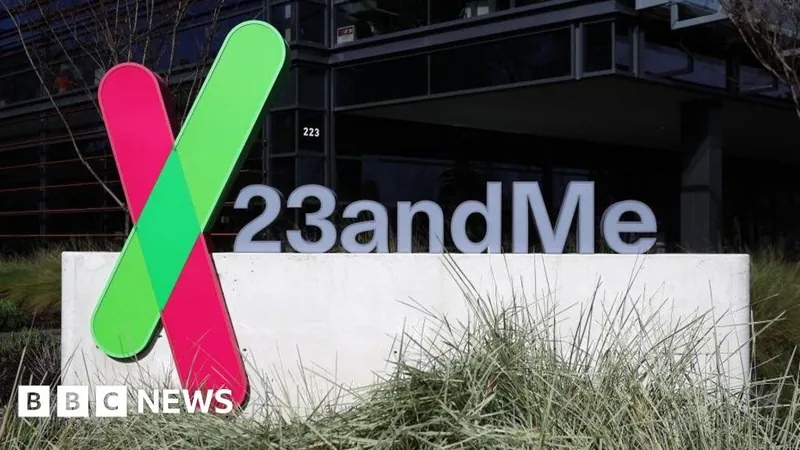
Will 23andMe Overcome Its Crisis? The Key to Protecting Your DNA
2024-11-03
Author: Michael
Just three years ago, 23andMe was riding high, with its stock price even exceeding that of tech giant Apple, fueled by a surge of interest from millions eager to uncover their ancestral roots through simple saliva tests. Fast forward to today, and the DNA-testing pioneer now finds itself in a precarious position, narrowly escaping a delisting from the stock market and struggling to amplify its once-thriving user base.
The company's stock has plummeted from a staggering $321 to around $5, indicating a catastrophic decline in market value, which now stands at a mere 2% of its former glory. The alarming freefall raises significant concerns about the enormous database of sensitive genetic information that 23andMe has amassed over the years and what might happen to it should the company go under.
When questioned about its future, 23andMe maintained a positive stance, insisting on its commitment to safeguarding customer data and preserving user privacy. However, how did this promising tech firm face the grim threat of potential collapse?
The DNA Gold Rush Diminishes
At its peak, 23andMe boasted a plethora of celebrity endorsements, with high-profile clients like Snoop Dogg and Oprah Winfrey. Many users reported shocking revelations, from unexpected familial connections to alarming genetic predispositions to health concerns. Unfortunately, as Professor Dimitris Andriosopoulos notes, the business model that once flourished has faltered significantly.
The reality is that once customers purchase their genetic reports, there’s little incentive for them to return, resulting in a stagnant revenue stream. Moreover, the company's ambitions to leverage anonymized genetic data for drug discovery have proven slow to materialize, as the lengthy and expensive nature of drug development continues to hinder profitability.
Leadership Turmoil
The crisis is mirrored in 23andMe's leadership. A significant turnover has taken place, with nearly the entire board resigning. Currently, only CEO and co-founder Anne Wojcicki remains from the original team. Rumors are swirling about the company's future, including speculation about either a complete shutdown or a sale; however, Wojcicki has reportedly expressed a desire to take the company private.
The Invaluable Commodity: Your DNA
While the volatility in the tech sector isn't new, the implications in 23andMe's case are particularly concerning due to the sensitive nature of the data it holds. As privacy advocate and author Carissa Veliz points out, individuals who utilize 23andMe are not just sharing their DNA; they're also sharing genetic information about their relatives, leading to ethical dilemmas regarding consent.
This raises the question: what happens to this critical data if the company ceases to exist or changes ownership? The Cambridge Judge Business School’s David Stillwell emphasizes the uniqueness of DNA data insecurity; unlike bank account hacks, which can be addressed with new accounts, your DNA profile remains a fixed identifier that carries continuous implications for personal privacy.
Safeguarding Your Privacy
Despite assertions from 23andMe about its commitment to data protection and adherence to privacy laws, history has shown that no company is immune to cyber threats. The firm itself suffered a data breach in the last year, raising alarms about the safety of its vast genetic repository.
Veliz urges a more stringent approach to data privacy. She highlights that the terms and conditions governing data use are often too broad, allowing companies to exploit user data with little accountability. Until there’s a significant overhaul in how personal data is treated in the digital landscape, the risks remain.
Conclusion
As 23andMe grapples with internal and external challenges, the stakes could not be higher for users who entrusted their genetic information to the company. In an era where personal data is critically valuable, only time will tell if 23andMe can adapt, survive, and truly safeguard the sensitive information of its customers.
Stay tuned as we continue to track developments in this unfolding saga that could redefine the landscape of genetic testing and privacy rights.









 Brasil (PT)
Brasil (PT)
 Canada (EN)
Canada (EN)
 Chile (ES)
Chile (ES)
 España (ES)
España (ES)
 France (FR)
France (FR)
 Hong Kong (EN)
Hong Kong (EN)
 Italia (IT)
Italia (IT)
 日本 (JA)
日本 (JA)
 Magyarország (HU)
Magyarország (HU)
 Norge (NO)
Norge (NO)
 Polska (PL)
Polska (PL)
 Schweiz (DE)
Schweiz (DE)
 Singapore (EN)
Singapore (EN)
 Sverige (SV)
Sverige (SV)
 Suomi (FI)
Suomi (FI)
 Türkiye (TR)
Türkiye (TR)